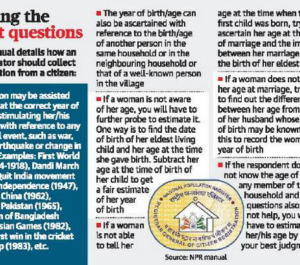
- The Narendra Modi government proposes to update the existing National Population Register, which already has an electronic database of more than 119 crore residents, by verifying the details of all respondents through house-to-house enumeration, according to an official manual on conducting the fresh NPR exercise.
- The NPR exercise has become controversial because the Citizenship Rules 2003 link the Population Register to the creation of a National Register of Indian Citizens (NRIC) or National Register of Citizens.
- Coupled with the passage of the Citizenship (Amendment) Act, 2019, which excludes Muslims, fears about an NPR-NRC have brought lakhs of people onto the streets in protest.
- Data for the NPR was first collected in 2010, and updated in 2015. The Modi Government has proposed that the next phase of NPR will be conducted along with Census exercise between April to September 2020.
- According to the government manual, the enumerators, all government officials, will “modify and correct the demographic data items”. They are also tasked with collecting mobile, voter card, Indian passport and driving license numbers from residents.
- The manual requires the “inclusion of all new residents, new households found in the local area during the field work”.
- The 2010 NPR form collected details on 15 parameters whereas a “pretest” form that was used to collect data on a trial basis from 30 lakh people in September 2019, sought additional details on columns such as “place of birth of father and mother, last place of residence” etc.. It also added details such as Aadhaar number, voter ID card number, mobile phone number and driving license number.
- The manual states that in cases where date of birth or age was not known, the enumerator could help the respondent by “stimulating her/his memory” with reference to historical events well known in the area such as a “war, flood, earthquake, change in political regime, etc.”

